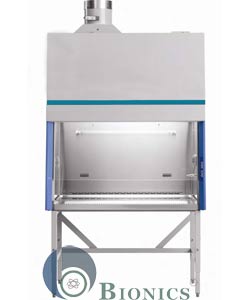The Growing Craze About the Biosafety Cabinets
The Growing Craze About the Biosafety Cabinets
Blog Article
Class 2 Biosafety Cabinets: Essential Equipment for Laboratory Safety and Microbiological Containment

In today’s scientific and clinical labs, safety for personnel and samples is non-negotiable. Whether it's biotech development, pharmaceutical research, or microbiological analysis, biosafety cabinets are central to preventing cross-contamination and safeguarding personnel.
Class 2 Biosafety Cabinets are widely adopted for offering three-way protection. These units are essential for labs working with infectious materials or clinical diagnostics.
Biosafety Cabinets – How They Work and Why They Matter
Biosafety cabinets are specially designed, enclosed systems that ventilate and filter lab air. They use high-efficiency filters to purify air entering and leaving the cabinet.
These units are generally classified into Classes I, II, and III depending on airflow and application needs. Among these, Class 2 cabinets are the most versatile and commonly used.
Defining Class 2 Biosafety Cabinets and Their Role
Class 2 Biosafety Cabinets ensure safety on all fronts—personnel, workspace, and biological material. They direct filtered airflow in a laminar pattern over the work surface.
Both incoming and outgoing air are HEPA-filtered to maintain sterility and prevent leaks. These cabinets are suited for clinical, research, and pharmaceutical lab applications.
Key Features of Microbiological Safety Cabinets
A Class 2 microbiological safety cabinet includes several integrated safety mechanisms such as:
• High-efficiency air filters to ensure clean workspace air
• Laminar airflow that minimises disruption and contamination
• Pressure differentials that maintain internal containment
• Germicidal UV lamps to disinfect the work area
• Low sound emissions to reduce fatigue
• Clear front panel for visibility and safety
These elements ensure safety, comfort, and efficiency in day-to-day lab tasks.
Where Class 2 Cabinets Are Used
Class 2 Biosafety Cabinets are key equipment in healthcare, molecular biology, and quality control. They are indispensable for handling clinical specimens, blood cultures, and biological reagents.
From universities to private pathology labs, Class 2 cabinets ensure lab hygiene and sample integrity.
Benefits of Using Class 2 Biosafety Cabinets
Using Class 2 cabinets offers multiple advantages including operator protection and experimental reliability:
• Prevents contamination during sensitive procedures
• Prevents accidental exposure to infectious materials
• Improves environmental safety by filtering outgoing air
These cabinets support biosafety goals while improving lab productivity.
Cabinet Types and Global Compliance
Top manufacturers design units compliant with major biosafety regulations worldwide. Class 2 units are sub-classified as A1, A2, B1, and B2—with each type offering different air handling systems.
• Type A2: Recirculates 70% and exhausts 30% of filtered air
• Type B2: Suited for labs dealing with toxic agents
Selecting the right configuration ensures compliance and safety.
Choosing the Right Biosafety Cabinet
Before purchasing, consider:
• The types of agents and materials handled
• Available lab space and utility infrastructure
• Ease of use, energy efficiency, and upkeep
• Service network and part availability
Consulting with experts ensures the cabinet fits both budget and compliance goals.
Safe Setup and Operation of Class 2 Cabinets
For optimal results:
• Avoid placing near doors, vents, or fans
• Schedule regular performance checks
• Ensure operators follow best practices
Operational best practices include:
• Maintain biosafety gear protocols
• Minimise hand movements inside the cabinet
• Wipe work areas with disinfectants regularly
• Treat UV usage as an overnight sterilisation method
Final Thoughts on Class 2 Biosafety Cabinets
Class 2 biosafety cabinets are vital equipment in laboratories dealing with biohazards. They ensure contamination-free experiments and personnel safety.
From clinical research to vaccine development, Class II cabinets maintain sterility in sensitive procedures. When investing in a biosafety cabinet, choose performance and reliability over cost-cutting—because safe science Biosafety Cabinets starts with smart containment. Report this page